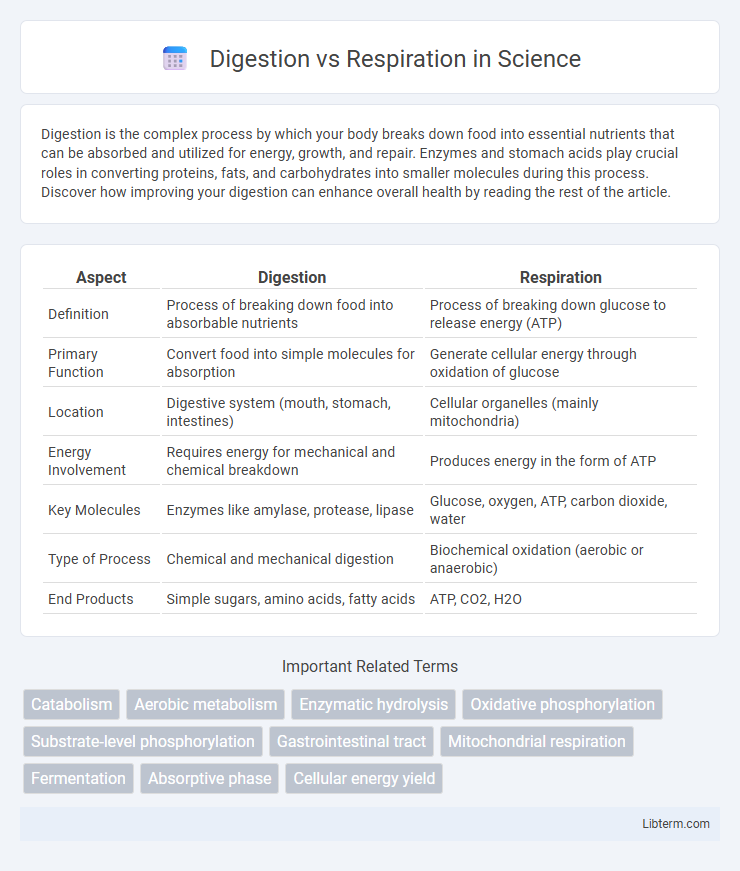Digestion is the complex process by which your body breaks down food into essential nutrients that can be absorbed and utilized for energy, growth, and repair. Enzymes and stomach acids play crucial roles in converting proteins, fats, and carbohydrates into smaller molecules during this process. Discover how improving your digestion can enhance overall health by reading the rest of the article.
Table of Comparison
| Aspect | Digestion | Respiration |
|---|---|---|
| Definition | Process of breaking down food into absorbable nutrients | Process of breaking down glucose to release energy (ATP) |
| Primary Function | Convert food into simple molecules for absorption | Generate cellular energy through oxidation of glucose |
| Location | Digestive system (mouth, stomach, intestines) | Cellular organelles (mainly mitochondria) |
| Energy Involvement | Requires energy for mechanical and chemical breakdown | Produces energy in the form of ATP |
| Key Molecules | Enzymes like amylase, protease, lipase | Glucose, oxygen, ATP, carbon dioxide, water |
| Type of Process | Chemical and mechanical digestion | Biochemical oxidation (aerobic or anaerobic) |
| End Products | Simple sugars, amino acids, fatty acids | ATP, CO2, H2O |
Introduction to Digestion and Respiration
Digestion is the biochemical process that breaks down food into smaller molecules like glucose, amino acids, and fatty acids, enabling nutrient absorption in the gastrointestinal tract. Respiration refers to the cellular process where oxygen is used to convert glucose into energy in the form of adenosine triphosphate (ATP), releasing carbon dioxide and water as byproducts. Both processes are essential for energy metabolism, with digestion providing the substrates and respiration generating usable energy for cellular functions.
Key Differences Between Digestion and Respiration
Digestion involves the breakdown of food into smaller molecules, such as glucose, using enzymes within the gastrointestinal tract, while respiration is the biochemical process that converts glucose and oxygen into energy (ATP) through cellular metabolism. Digestion primarily occurs in the digestive system and produces nutrients required for cellular functions, whereas respiration takes place in the mitochondria of cells to release energy used for physiological activities. Key differences include digestion being an extracellular process with mechanical and chemical components, contrasted with respiration as an intracellular process focused on energy production via oxidative phosphorylation.
Biological Purpose of Digestion
Digestion serves the biological purpose of breaking down complex food molecules into simpler forms such as glucose, amino acids, and fatty acids, which cells can absorb and utilize for energy and growth. It supports cellular respiration by providing the necessary substrates that mitochondria convert into ATP, the primary energy currency of the cell. Unlike respiration, which generates energy through the oxidation of these substrates, digestion focuses on nutrient acquisition and preparation for metabolic use.
Biological Purpose of Respiration
Respiration primarily serves the biological purpose of releasing energy stored in glucose molecules through cellular processes, enabling vital functions and sustaining life. Unlike digestion, which breaks down food into absorbable nutrients, respiration converts these nutrients into adenosine triphosphate (ATP) by utilizing oxygen and producing carbon dioxide as a byproduct. This energy transformation is crucial for maintaining cellular activities, growth, and repair in living organisms.
Main Organs Involved in Digestion
The main organs involved in digestion include the mouth, esophagus, stomach, small intestine, and large intestine, each playing a crucial role in breaking down food and absorbing nutrients. Accessory organs such as the liver, pancreas, and gallbladder secrete enzymes and bile that facilitate the chemical breakdown of food. These organs work collaboratively to convert food into energy and essential nutrients for the body's metabolic processes.
Main Organs Involved in Respiration
The main organs involved in respiration include the lungs, trachea, bronchi, and diaphragm, which work together to facilitate breathing and gas exchange. Oxygen is inhaled through the trachea, passes into the bronchi, and reaches the alveoli in the lungs where oxygen diffuses into the bloodstream. The diaphragm plays a critical role by contracting and relaxing to enable air movement into and out of the lungs, maintaining efficient respiratory function.
Chemical Processes in Digestion
Chemical processes in digestion involve enzymatic breakdown of food molecules into absorbable nutrients, including carbohydrates broken down by amylase into sugars, proteins degraded by proteases into amino acids, and lipids emulsified by bile and hydrolyzed by lipases into fatty acids and glycerol. These hydrolysis reactions occur primarily in the mouth, stomach, and small intestine, facilitating nutrient absorption into the bloodstream. Unlike cellular respiration, which generates ATP by oxidizing glucose, digestion focuses on chemical disassembly of macromolecules to enable subsequent metabolic processes.
Chemical Processes in Respiration
Respiration involves biochemical reactions where glucose molecules undergo oxidation to produce energy in the form of ATP, primarily through glycolysis, the Krebs cycle, and the electron transport chain. Enzymes like dehydrogenase and oxidase play crucial roles in facilitating redox reactions that transfer electrons and release energy stored in chemical bonds. This metabolic process contrasts with digestion, which breaks down macromolecules into smaller units through hydrolysis but does not directly generate cellular energy.
Relationship Between Digestion and Respiration
Digestion breaks down food into simpler molecules such as glucose, which are absorbed into the bloodstream and transported to cells for respiration. Cellular respiration uses oxygen to convert these molecules into energy (ATP), carbon dioxide, and water, linking both processes in energy metabolism. Efficient digestion ensures a continuous supply of nutrients necessary for sustaining respiration and maintaining cellular functions.
Importance of Digestion and Respiration in Human Health
Digestion breaks down food into essential nutrients like glucose, amino acids, and fatty acids, which the body absorbs to fuel cellular functions and maintain energy balance. Respiration converts oxygen and glucose into adenosine triphosphate (ATP), the primary energy currency for cellular processes and vital organ function. Proper digestion and respiration ensure efficient nutrient absorption and energy production, supporting overall metabolic health and immune system strength.
Digestion Infographic

 libterm.com
libterm.com